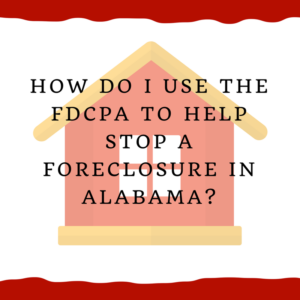How do I use the FDCPA to help stop a foreclosure in Alabama?
 Many folks (and lawyers) do not think of the FDCPA (Fair Debt Collection Practices Act) when it comes to stopping Alabama foreclosures. But it can be a powerful law when used correctly.
Many folks (and lawyers) do not think of the FDCPA (Fair Debt Collection Practices Act) when it comes to stopping Alabama foreclosures. But it can be a powerful law when used correctly.
We’ll do this in the article:
- When does the FDCPA apply in a mortgage context?
- What does the FDCPA prohibit a mortgage company from doing in a foreclosure setting?
- Some examples of how the FDCPA can stop or reverse a foreclosure.
- How does the FDCPA work with the other tools you have to stop a foreclosure?
The reason the FDCPA is so powerful is it can get you money damages, get attorneys fees paid, and is basically a “strict liability” statute. Which means it gets violated, normally we don’t care about intent.
Mortgage company violates the law, it is normally in trouble.
When does the FDCPA apply in a mortgage context?
When the mortgage company is considered a debt collector.
The basic rule is if the mortgage company does not OWN the debt, but instead is a “servicer” then we simply look to see when the mortgage company first got the debt.
Was it in default or not?
And we also look to see if the mortgage company has a major part of its business is collecting debts owed to someone else.
Almost all of the mortgage servicers meet this definition and usually, the loan was transferred to them after it was technically in default.
While your situation has to be carefully examined, usually your mortgage company will qualify as a debt collector under the FDCPA.
What does the FDCPA prohibit a mortgage company from doing in a foreclosure setting?
In general, the FDCPA forbids collectors from lying or doing anything that is unfair.
So no lying about anything related to the loan. No lying about your rights to bring a court action to challenge an upcoming foreclosure. No lying about not receiving your loss mitigation documents when you have proof the mortgage company received your document.
Unfair would be to foreclose when no right to foreclose.
So here’s one way to think of it. All the things the mortgage companies have loved doing over the years are now being challenged under the FDCPA.
They are having a complete come apart because of this.
They are whining to the judges about how they can’t operate under these restrictions. See for many years they have been allowed to lie (over the phone) with absolute immunity in Alabama. They have bragged about how the courts let them get away with this. How every Alabama homeowner is naive if they believe anything a mortgage company says over the phone.
But with the FDCPA, now they can be sued.
Drives them crazy!!
Some examples of how the FDCPA can stop or reverse a foreclosure.
Here are some examples — there are many more but these can give you an idea:
- You send a proper validation letter which is ignored
- Foreclosure lawyer is foreclosing without sending the proper default letter (notice of default)
- The mortgage company or foreclosure attorney have made a misrepresentation of the debt
Proper validation letter is sent but is ignored and the foreclosure proceeds
You get a notice from the mortgage company and/or the foreclosure attorney. It has the standard “you have 30 days to dispute” and “you can request validation” etc.
So you do this.
You send a proper validation letter.
Now the debt collectors (mortgage and foreclosure attorney) have a choice. Do nothing or respond before proceeding with foreclosure.
Do nothing means . . . they do . . . nothing. Nothing at all. No foreclosure.
But if they want to foreclose, then they have to properly respond to your letter before they foreclose.
If they violate this, consider suing under the FDCPA for money damages. This can stop or reverse a foreclosure….
Bogus and defective notice of default letter gives you the opportunity to sue
We have talked about how the default letter (notice of default) must be accurate. What if you get a bogus one?
Without the correct default letter, no acceleration can happen.
Without a proper acceleration letter, no foreclosure can happen.
Everything is built on a proper and valid default notice.
So this gives you a chance to sue before or after the foreclosure.
Misrepresentations about the debt
What if the amount is wrong? The dates of non-payment are wrong? There are lies about forced placed insurance? Or about your loss mitigation efforts?
These give you the opportunity to consider suing. No misrepresentations should occur in any collection of debt by a debt collector.
How does the FDCPA work with the other tools you have to stop a foreclosure?
The FDCPA is powerful but it is only one tool.
You need to look at RESPA also as well as Alabama state law and all of your other options/tools.
The basic concept is figuring out what the mortgage company did wrong. Usually, these guys are so arrogant and bad that this is not hard to find their illegal actions.
Then we examine our tool chest — all the state and federal laws — to see what works best. Sometimes we need a hammer for the job. Or a saw. Screwdriver works best sometimes.
We pick the best tools and then go about repairing the situation — stopping the foreclosure or reversing a foreclosure.
If you want our help in understanding your options — no obligation — and you live in Alabama, call us at 205-879-2447 or fill out our contact form below and we’ll send you some free valuable information.
We look forward to chatting with you!